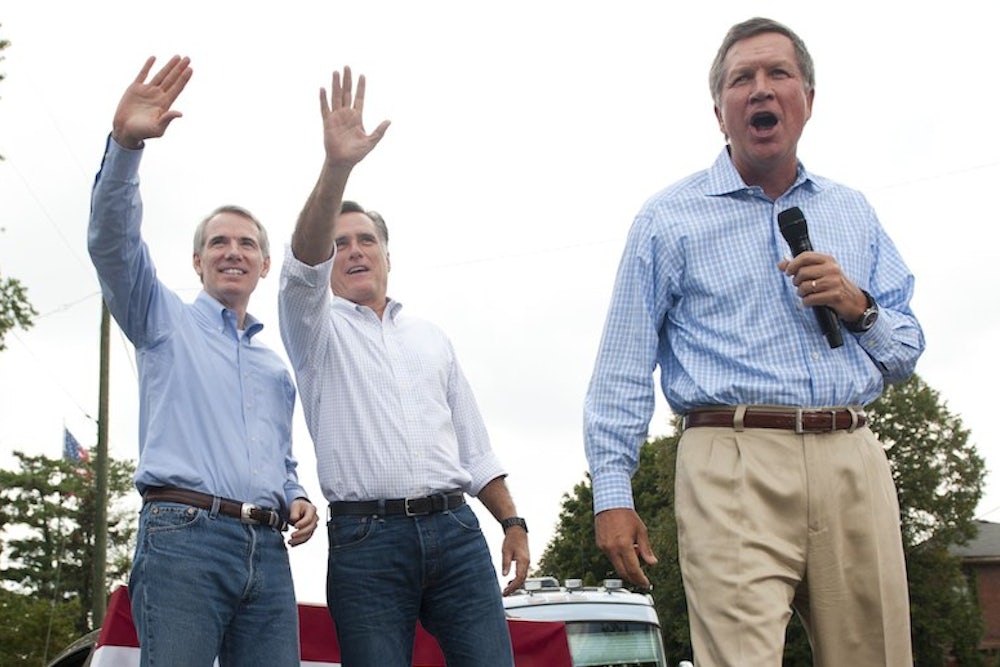When the Republicans convene in Cleveland two years from now, there will be one extra elephant in the room.
The announcement of Cleveland as the recommended site for the 2016 convention came on Tuesday. Assuming the party apparatus ratifies the choice—and everybody seems to think it will—the problem won't be the choice of city per se. The issue will be the state and the debate about Obamacare and Medicaid that's played out there for the last year-and-a-half.
Under the Affordable Care Act, states can make Medicaid available to anybody whose household income is less than 133 percent of the poverty line, which for a family of three works out to about $31,700 a year. It's how Obamcare's architects envisioned the poorest people without insurance would get coverage under the new law. But conservative state officials have resisted taking that step, arguing that the expansion would place too great a burden on state treasuries, build on a flawed model for insurance, prop up a big government program, and so on.
Conservative Republicans in Ohio were among them and, because they control the state legislature, they were able to block expansion for a while. But one Ohio Republican saw things differently. While a bona fide conservative who opposed Obamacare, he figured that Medicaid expansion was still a good deal for his state. He knew that hundreds of thousands uninsured residents would eventually get coverage and the federal government would be picking up most of the additional cost, thereby infusing billions of dollars into the state economy. This Republican also realized that most of that money would go directly to hospitals and health care providers, whose growth had been a major factor in Ohio’s recovery from the recession. And this Republican understood that Medicaid expansion had strong support from Ohio’s business community.
Why does this matter? Because the Republican happened to be Governor John Kasich. And he made a huge issue out of it.
Kasich took his case to the legislature and, eventually, the people of Ohio. To his great credit, he made the case for expansion not just on economic grounds but on moral grounds as well, citing his faith and teachings of the “Good Book.” During his annual State of the State Address, Kasich said, “I can’t look at the disabled, I can’t look at the poor, I can’t look at the mentally ill, I can’t look at the addicted and think we oughta ignore them. For those that live in the shadows of life, those who are the least among us, I will not accept the fact that the most vulnerable in our state should be ignored. We can help them—and I want all of you to think about this.”
Kasich never did get the legislature to go along, but he was able win approval of the expansion by going through the state’s Controlling Board, a separate administrative body. Critics said the maneuver was unconstitutional, but the state Supreme Court upheld the decision and the expansion went forward. The early signs have been promising. By early May, state officials said, more than 184,000 newly eligible residents had enrolled, exceeding projections. Hospital executives say they are seeing far fewer uninsured patients who require charity care.
Here's the problem for Republicans. Whether or not they intend to make Obamacare a central focus of the 2016 presidential campaign, they’re going to talk about it at their convention. The conservative base would have it no other way. But if Kasich wins reelection this year, then the host state governor, a well-regarded conservative and model Republican in almost every other respect, will also be the state’s most outspoken and eloquent spokesman for why the right’s absolutist opposition to the Medicaid expansion is so wrong.
It’s not the end of the world, obviously. People make way too much of convention geography and these sorts of rhetorical contradictions. But this was already a difficult issue for national Republicans to finesse, as writers like Steve Benen, Greg Sargent, and my colleague Brian Beutler have discussed. Putting the 2016 convention in Ohio, where the Medicaid expansion has been such a prominent issue, probably won't make that easier.
